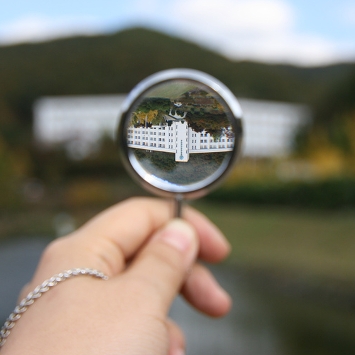
We all want to be the best version of ourselves (not always), but many wonder if it is really possible to become a person when they reach adulthood. The truth is that you can always improve, at any age, but it takes commitment. There are many aspects of our person that can be fine-tuned. But where is the best place to start to be a better person? What is the easiest approach? What are the aspects of your person that are better to work on?
With your well-being and the interests of others in mind, here are some of the best ways to become a better person.
let go of anger
We all experience anger in our lives. However, uncontrolled anger can create problems in our relationships and even in our health. All this can generate even more stress and more problems, making our lives more complicated than necessary and preventing us from being the best version of ourselves. This is why learning to manage and eventually let anger flow is so important in the process of personal growth.
It's not always easy to let off steam, but the first step in managing your upset state is learning to recognize anger and knowing what to do when you feel angry.
Recognizing anger is usually easy if you make an effort to notice when you're feeling upset and decide to manage this state instead of holding it back or taking it out on others. Focus on why you are angry and remember that there is a big difference between feeling angry and acting angry. So know what your options are.
You can work on your beliefs to get rid of the anger: find out more about the situation or just remind yourself that there may be things you don't know yet. This way, you could at least put your anger on "pause."
For example: it may be that that person who cut you off in traffic was distracted by the problems that afflict him in life.
Or: If a friend seems rude to you, ask how their day is going and you might find out why.
You can also focus on the sources of your nervousness and eliminate as many as possible. For example: If you feel frustrated and angry when you're in a hurry, try to free up some space in your schedule (even if that means saying no a little more), so you can slow down and eliminate this source of anxiety. . nervousness.
If a certain person makes you angry, even though the situation hasn't changed after talking about it, try to limit their role in your life.
It's also important to learn to let residual resentment and anger flow at the end of each day. Don't wake up feeling nervous about the last day. Focus on forgiveness. It is better to shake off the weight of resentment as soon as possible. And if you can live in the present as much as possible, forgiving the past becomes much easier.
Practicing relaxing activities like meditation can help you let go of anger. Focus on letting the weight of the past slip away. Focus your attention on the present moment, so it's easier to stop ruminating and finally find peace.
support other people
Helping others may seem like an obvious step on your way to becoming a better person. We generally think that "good people" are those who sacrifice themselves for others. This is what, in the minds of many, makes an individual a "good person." In fact, good deeds also have a positive impact on those who practice them (and not only on those who receive them), since there is a connection between being altruistic and the well-being of the person.
Some research has confirmed that, in terms of psychological well-being, it may be more important to give than to receive. So while you're stressed out and busy dealing with personal and family problems, reaching out to others when it's not absolutely necessary could also bring important benefits. It's true: being selfless with strangers, as long as you don't neglect your loved ones, can help you be happier and relieve stress, as well as make you a better person.
Play to your strengths
Losing track of time when engrossed in completing a job or some other demanding activity is a state psychologists call "flow," a condition most of us are probably familiar with. Flow is what happens to us when we are fully immersed in a hobby, or when we are learning a new skill, or in any case, in demanding activities that contain the right mix of challenge and lightness. (When we feel too much pressure, stress increases, while when things are too simple, we get bored: finding the right compromise between challenge and ease allows us to stay pleasantly focused.)
You can experience the flow by writing, dancing, creating or absorbing new knowledge that you can practice and/or pass on to others. This status is a great indicator of how good a business is for you. When you are in a state of total absorption, you are playing to your strengths, with a positive return to your well-being and happiness. And if through these activities you are somehow making the world a better place, you are right.
When you know yourself well enough to know what your strengths are, and also find ways to use them to benefit others, you're well on your way to becoming a better (and happier) person. Do what you are good at and do it with full participation.
Use "phased change" tactics
Ask yourself, "If you had a magic wand, what would you want in your future?" Ignore the idea of the path you need to take to get there, vividly imagine your ideal life and what should be in it.
Take a few minutes to make a list, on a piece of paper or on your computer, of all the changes and goals that you would like to see included in your ideal future. Be specific about what you want. It's also okay to want something we seem to have control over, like a partner who's perfect for you. Simply write it down.
You can follow the lead of many companies and plan your life one year, five years and ten years apart. (It does not have to be a list written in stone, immutable, but a list of wishes and goals). Realize that your hope for the future can help you feel less trapped and stressed in your present life, and take advantage of more opportunities for change, when they occur to you.
There are many ways to approach change, but the “Phased Change” model can probably lead you to improvement more easily than other methodologies. This pattern of change can be adopted whatever your current mindset is, and it can work for most people.
The phased change model
- Pre-contemplation: you ignore the problem
- contemplation: realizes the problem
- preparation: preparation for change
- action: act in the right direction
- retention: maintain a new habit
There are two basic rules to follow this gradual change. The first rule of this road is that you don't have to force yourself to make changes before you're ready. The second rule is that you should never give up, even when you feel like you are taking steps backwards. It may happen that you encounter some problems in the improvement process, the important thing is to never stop.
Beware
You are not always in control of the circumstances you face, but you can control yourself and how you take care of them, to reduce your stress levels and help you grow as a person as you face life's challenges.
Taking care of yourself is vital to developing the resilience necessary to overcome the problems and stress that inevitably plague us in life. When you are very tired, eat poorly, and feel poorly physically, you are much more susceptible to the stressors you face in your daily life. If you are physically ill, you are more likely to react incorrectly when in critical situations and thus further aggravate the illness.
On the contrary, when you take care of yourself (both in body and mind), you can be more proactive in everything you have to face, using all the resources you may have available and growing as a person. By doing so, every problem you face will become an opportunity.
The basics of personal care
The most important aspects to consider and take care of are:
- dream
- Food
- Social relationships
- recuperación
Il sleep it is important for your physical and mental well-being, because poor and poor sleep can leave you more vulnerable to the problems you face. Lack of sleep can wear your body down, both in the short and long term. Poor sleep can also cause you to gain weight (or lose too much weight).
The same is true for the poor nutrition. Eating poorly can make you feel bloated, sluggish, and gain weight over time. You need the right fuel to meet life's challenges, but when we're stressed, it's often junk food that we take it out on.
feel connected with others, it helps you feel more resilient to whatever challenges life throws your way. Good friends can help you process negative emotions, come up with solutions, or simply help you disengage from problems when needed. Sometimes it's hard to make time for your friends when you have a busy and stressful life, but often it's our friends who can help you become a better person, both with their support and inspiration.
Finally, it is important to take some time for you, to recharge the batteries. This may mean meditating, reading/writing, exercising, or watching a TV series. This is especially important for introverts, but everyone needs time to themselves, at least once in a while.
Learn to be "User-Friendly"
Our relationships can create a haven from stress and help us become better people at the same time. Likewise, they can also be an important source of stress when there is a poorly resolved or still unresolved conflict. The good thing about this is that as we work to become better friends, associates, and relatives, we also become better people.
Some of the things you can do to improve your relationships and improve yourself is to learn some conflict resolution strategies. Be a good listener, understand the perspective of others you are in dispute with, learn anger management techniques.
All of these things can help you minimize the stress you normally experience within a relationship of any kind, making it even stronger. Close relationships generally offer plenty of opportunities to practice these skills, so you may also appreciate certain opportunities when they come your way, helping you feel less upset about arguing with a person.
Now it's up to you to challenge yourself to become a better person!
We have come to the end of this brief guide on self-improvement. Unfortunately, the road to personal growth is slow and exhausting, it takes time to change habits, but if you have the will, you can get anywhere. Some of the things I've told you may seem a bit trivial, but I'm hoping (in fact, I'm sure) that at least some of the concepts I've written above can help, or at least provide you with some nourishment. for thought. Until next time!
They may be interested in:
- These are the 7 secrets you must know to get rich
- How to forget a person? 15 effective tips
- Phrases to Silence a Person: The 100 Most Cynical
- How to help a depressed person
- 30 phrases for when you miss someone special
- 12 discipline phrases that will lead you to success

























